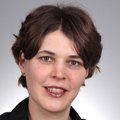17th Karlsruhe Dialogues – Speakers
The ‘In-Between Society’: Tradition and Modernism in Conflict
Dr. Anne Françoise Weber
Speaker

Dr. Anne Françoise Weber works as a journalist for the German station Deutschlandradio in Cairo. The graduate of the Berlin Journalism School worked for Radio France Internationale, the German Protestant news agency Evangelischer Pressedienst and the Friedrich Ebert Foundation, among others. She studied social sciences, Islamic studies, and Protestant theology in Berlin, Beirut, Paris, and Marburg, and earned her doctorate with a dissertation on Muslim-Christian relations in Lebanon.
Her publications include: The Itineraries of World Religions towards Democracy. A Conference Report (2009), The Middle East in the Media. Conflicts, Censorship and Public Opinion (2009), and Staatsfeminismus und autonome Frauenbewegung in Tunesien (2001).
Statements
- Preservation in the face of change: From your point of view, what does this mean in the light of the processes of globalisation and glocalisation?
Is seems to be a human need to be rooted in traditions, even when these are often younger and more ‘foreign’ than assumed. The import of Saudi-Arabian forms of veiling to Egypt in the wake of work migration is an example for how globalisation and glocalisation bring about a change that is seen as a conservation of old traditions by many. The ideal of the housewife in Germany is also a tradition that has only really started to spread in the 19th century.
- In the face of increasing disorientation, what is it that holds a society together in the age of globalisation, and what drives it apart?
Communal values like freedom and solidarity hold our society together. What often drives us apart is the conflict over which values are the ‘right’ ones, and the claim that people from other societal groups have fundamentally different values.
- Our society stands between traditional values and local everyday routines on the one hand, and between rapidly changing attitudes and behaviours on the other hand. What is the role of women concerning these processes of change in the realm of civil society?
Wherever women are seen as guardians of tradition, the potential for development is restricted. Wherever women demand more equality and a different division of family work, they question the traditional conception of roles.

